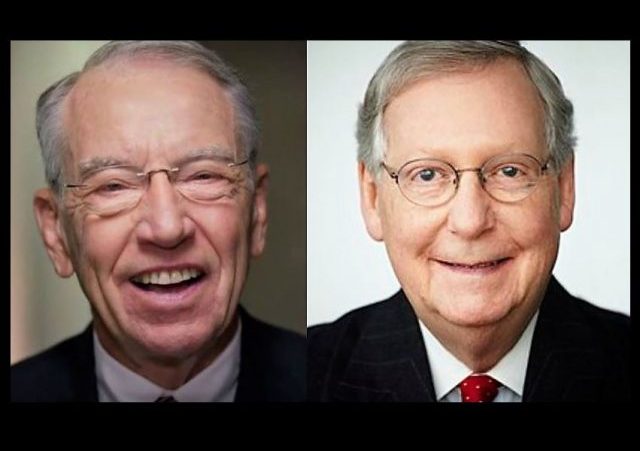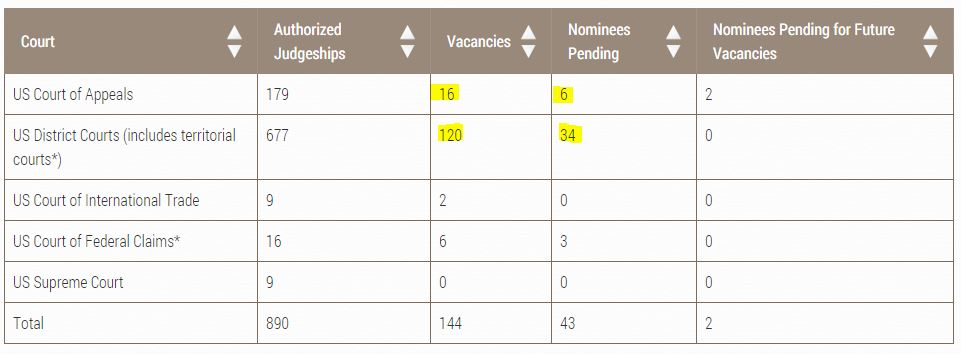Proposed Senate rule change may speed through Trump nominees
Trump set a record on Appeals Court confirmations, but there are still over 100 judicial vacancies.

Donald Trump took office with the unprecedented ability to reshape the federal judiciary, with over 100 vacancies as of the Inauguration. Trump had the possibility of nominating in just one term in office nearly half the federal judiciary.
Democrats’ removal of the judicial filibuster in 2013 (the so-called Nuclear Option) cleared the way for Republicans to fill these vacancies regardless of Democrat objections, assuming Republicans retain control of the Senate in 2018.
We have detailed almost since Inauguration Day the delay tactics Democrats in the Senate have used to delay confirmation of Trump nominees, both judicial and administrative.
Chuck Grassley has steadily moved judicial nominees through the Judiciary Committee, and has signaled willingness not to allow “blue slip” courtesies to turn into de facto filibusters. But even once nominees get through Committee, there is a further backlog whereby Democrats insist on a full 30 hours of debate for each nominee. So the pipeline gets clogged by Democrats first at the Judiciary Committee, and then by extended floor debate time.
Despite this stall, Trump has had a record 12 judicial nominees confirmed to courts of appeal, as HuffPo laments:
Almost a year into his job, President Donald Trump’s biggest accomplishment isn’t any specific legislation that’s passed or executive action he’s taken. It’s how he’s reshaped the courts.
Trump is breaking records with his judicial appointments. The Senate voted Thursday to confirm James Ho to the U.S. Court of Appeals for the Fifth Circuit, which bumped to 12 the number of Trump’s nominees approved for the circuit courts. That’s the most any president has gotten confirmed during a first year in office since the circuit courts were created in 1891. He surpassed Presidents Richard Nixon and John F. Kennedy, who had 11 circuit court judges confirmed in their first year. For President Barack Obama, the number was just three.
Despite this “record,” there is a lot of work to be done. As of today, as the chart below shows, there are still 16 Court of Appeals vacancies (of which 2 are future vacancies for known retirements) for which there are 2 pending nominees. (Not sure how the confirmations this week affect these numbers). There also are 120 District Court vacancies for which there are 34 nominees.
The current nominees need to be moved through the system to confirmation, and Trump needs to pick up the pace of nominations. The confirmation process may be getting a big boost soon.
The floor debate stall tactic may be coming to an end. Roll Call reports that next week the Senate may shorten the debate time for nominees:
The Rules and Administration Committee will meet on Tuesday to consider a resolution sponsored by Sen. James Lankford, R-Okla., that would reduce the time the chamber debates nominees drastically from the current 30 hours after debate is cut off.
High-ranking executive branch nominees and most judges or justices would get eight hours of post-cloture debate. District court nominees would get two hours of debate time.
Republicans have fumed that their Democratic colleagues have insisted on full debate time for most such nominees, although this week they have yielded time back.
And it comes at time that the Senate is setting a record for the number of appellate court judges confirmed during a president’s first year.
Sen. Roy Blunt, R-Mo., a former Rules and Administration chairman and now vice chairman of the GOP conference, said Democrats were abusing Senate procedure. “It clearly should not take us a whole week to confirm three people,” Blunt said Tuesday after the weekly caucus meetings.
Blunt said he was frustrated that Democrats are pushing it and that he does not think “the rules to protect the minority” should stay.
There is no excuse for any of the current vacancies remaining vacant when election day 2018 comes.
While it’s unlikely, given the numbers of which Senators are up for reelection, that Republicans will lose control of the Senate, it’s not impossible. The loss in Alabama helped Democrats take a near impossibility of taking over the Senate into an long-shot.
Given that the reformation of an institution is at stake, Republicans should not be risking even a long-shot loss.
 DONATE
DONATE
Donations tax deductible
to the full extent allowed by law.










Comments
Grassley is doing good work here, but it’s a shame that it’s Grassley that has made himself so important on this. It gives him the leverage he needs to hold the rest of the country hostage to the alcohol/fuel mandate which benefits his contributors, but hurts the rest of the country.
Having to put corn in my pickup, lawn mower and weed eater really makes me fume. Why should people in the other 49 states care about jobs in Iowa when they are ruining their automotive engines? Finding pure gas for my small engines is a hassle and it always costs nearly $1 more. The corn needs to go!
All ethanol should be, by law, aged in oak casks.
We are buying 90 octane non-ethanol for slightly less than the price of mid-grade with ethanol. There are three gas stations within easy driving distance carrying it, and even the most expensive is the same price as 93 octane with ethanol.
Congress can’t seem to get their hands out of our pockets and their heads out of the lobbyist’s arses, both parties included. Perhaps Trump’s greatest contribution to making America great again will be the court nominees.
“Congress can’t get their hands out of OUR pockets…..”
The Republicans don’t control the Senate. The uniparty does and that party is controlled by Democrats!
so what happens when the GOP doesn’t have the Senate anymore… what’s good for the goose and all.
The GOPe/Uniparty “has” tended to seat Democrat judges, with a couple of exceptions for sure. I’m willing to risk it and get a hundred non-activist judges seated. The Democrats have proved with their actions, over the 50 years, they only care about power and advancing ideologues to the bench to do what cannot be done by the legislature or ballot box.
“so what happens when…”
Nothing. The dems will do whatever is needed.
30 hours of “debate” for each nominee? Ridiculous, does anyone change their opinion based on these “shows”? Is there anyone else in the chamber when they are making their “debate” arguments?
Once a nomination is made, there should be a 2 week period when opposition can write a position paper outlining their specific objections. After that – take a vote and move on.
Could there a group of nominees less qualified. Shameful and embarrassing.
Could there (be) a commenter less qualified. Shameful and embarrassing.
That’s magnanimous of them, considering how it is the GOPe holding up Trump’s nominees. You know how Trump could get ALL 100 slots filled?
If the Senate went into recess.
Strangely, McConnell won’t allow that to happen. It’s puzzling.